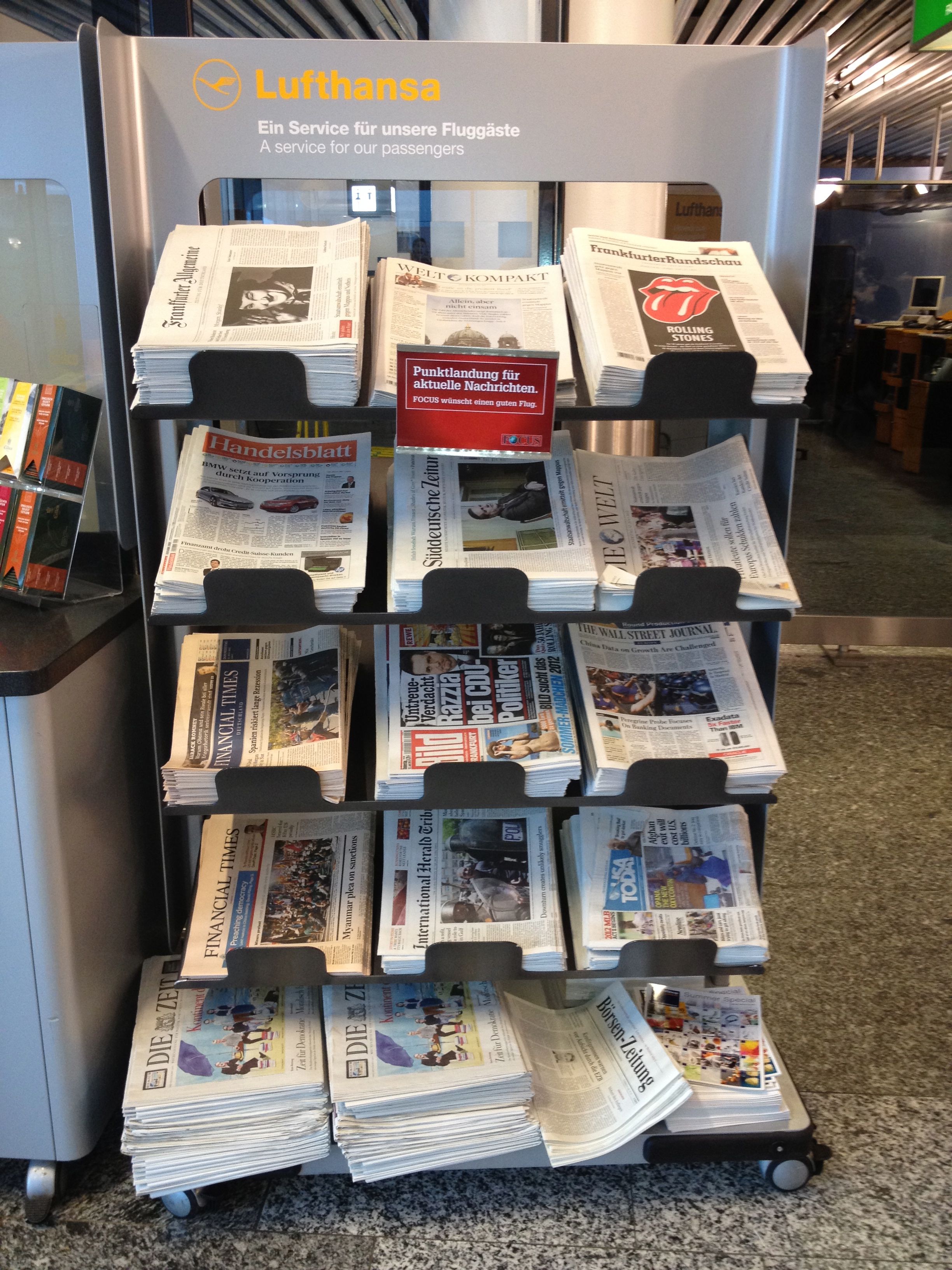
Lufthansa makes sure its passengers are fully ready for the day with racks and racks of free newspapers (this is in the airport at Frankfurt).
Well, of course there were the newspapers (see photo at left); but what else? At this time of year, I get asked this question more often than at any other, so I thought perhaps I would attempt an accounting.
First, on the more or less continuing education / professional front, I finished and am happy to recommend:
Tubes, by Andrew Blum — To quote an aside in an interesting review by Alan Jacobs of a couple of the other books I’m going to mention in the new issue of Books & Culture, this book is a reminder “of the stubbornly physical nature of the Internet.” Our wireless world is an awfully long way from wireless, and this is a fascinating look at the wires — and, yes, the tubes they’re in, and the locations those tubes meet one another. Blum decided not to be satisfied with wondering where the Internet is, and we’re the better for it.
The Man Who Invented the Computer, by Jane Smiley — A biography of John Atanasoff, a claimant to that title who at least had part of his claim upheld in a court of law. The key locations in this account are no less interesting than those in Tubes: Rock Island, Illinois, and Ames, Iowa, to name two. Sure, the title is hyperbolic, but Jane Smiley is Jane Smiley. Among her other nonfiction, I like to recommend 13 Ways of Looking at the Novel (2005).
Turing’s Cathedral, by George Dyson — Alan Turing is in the title of this book, but perhaps you could say that the cathedral was in New Jersey, at Princeton’s Institute for Advanced Study, where in the 1950s you would find John von Neumann, some interesting faculty dynamics, and a very very early digital computer. George Dyson is Freeman’s son and Esther’s brother, BTW.
(Books in this category that I didn’t finish but should have: Steve Jobs by Walter Isaacson; The Power of Habit by Richard Duhigg. Book that I didn’t start but evidently would have encountered before: Imagine by Jonah Lehrer.)
On the general-reading-list front, not as much as I should have. But still:
The Greater Journey, by David McCullough — We’ll always have Paris. 19th Century Paris, anyway. I guess I could tie this to the Internet by saying there’s a lot of Samuel F.B. Morse, and Morse invented the telegraph, and the telegraph was (as Tom Standage’s wonderful book would have it) The Victorian Internet. But it more than stands on its own.
A Killing in the Hills, by Julia Keller. The first in a projected series of mystery novels by my former Tribune colleague; she tells me she has submitted #2 to the publisher. No regular mystery reader, meaning I have little basis for comparison; but the intricate plotting was to me as breathtaking as the prose.
And, saving the best for last:
When I Was a Child I Read Books, by Marilynne Robinson. Her novels of course deserve their accolades, but her collections of essays, such as The Death of Adam (2005), seem the pinnacle of her art. The present collection is in somewhat the same vein. Last year I enjoyed her Absence of Mind, actually a series of lectures she gave at Yale; as in that one, every piece in this collection is worth putting down to ponder immediately upon conclusion. The book I’ll be giving away this Christmas, I think.
Classes at Medill resume Sept. 27. Will I get Steve Jobs read by then? The suspense is palpable.
